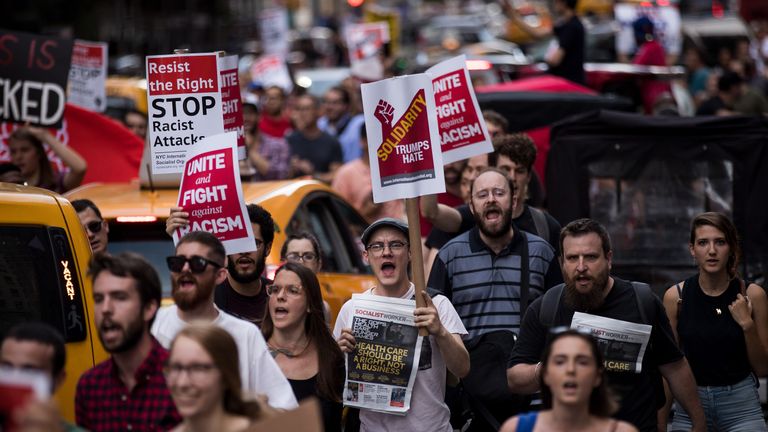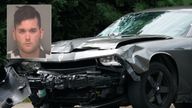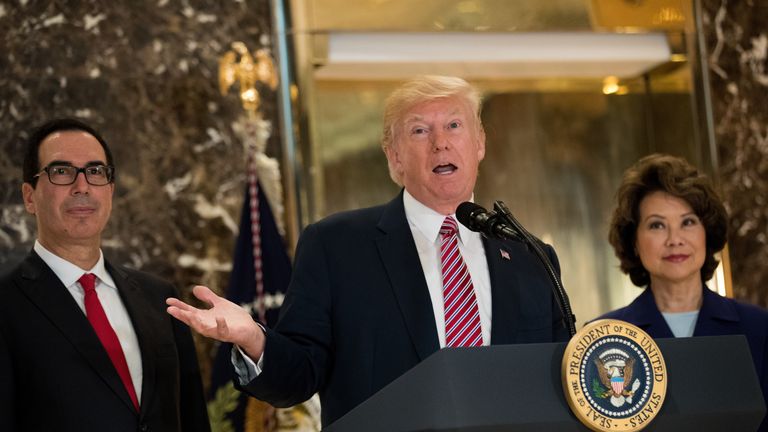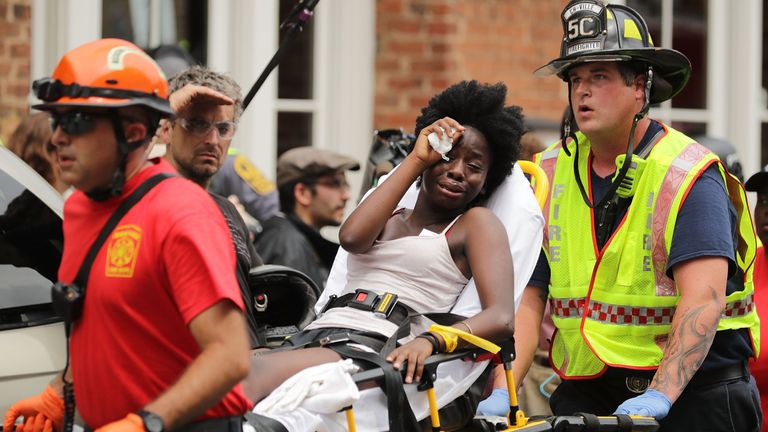Donald Trump fuels Charlottesville flames with unapologetic remarks
The President may always struggle to denounce the alt-right as it becomes clear he doesn't see the Virginia violence as one-sided.
Wednesday 16 August 2017 16:19, UK
It was billed as a structured announcement about infrastructure.
White House officials advised that the President would emerge from the golden elevator in Trump Tower, deliver his remarks and then go back upstairs.
But when he faced a flurry of questions about Charlottesville, .
General John Kelly, the President's new chief of staff who was drafted in to bring discipline to the White House, folded his arms, looking at the floor as a testy back and forth with the press ensued.
Mr Trump was unmasked and unapologetic, blaming both sides for the weekend's violence in the Virginia city.
On Monday, the President had read from a script to condemn white nationalists, two days after he issued his first remarks on the Charlottesville clashes.
Insiders say he resented being pushed to revise his words in order to defuse the growing storm.
Some commentators said it looked like a hostage video, a leader forced by his advisers to say what they wanted.
But in his home city of New York, Mr Trump changed gear, giving his unvarnished views.
Whatever you feel about the unorthodox leader, he is perhaps America's most transparent president ever.
This was a window into what he really thinks.
The nature of the Charlottesville protests were becoming clear on Friday night, when demonstrators chanted white supremacist slogans at a torchlight parade through the city.
But Mr Trump explained his delay in condemnation because he wanted to gather "the facts" first.
He hasn't demonstrated that same thirst for facts when reacting to suspected violent incidents where Islamist extremism is at play.
But it is now obvious the President does not see what happened in Charlottesville as a one-sided affair.
Among white supremacists, he said, were some good, peaceful people protesting the removal of a statue (of a man who led an army against the US government).
He is clearly convinced there were plenty of violent individuals among the counter-protesters as well.
Many of his supporters agree, some equating Black Lives Matter with the neo-Nazis.
When the President said on Saturday there were "many sides" to blame, he meant it.
David Duke, a former KKK Klansman, and other far-right protagonists revelled in Mr Trump's conclusion, emboldened by the President's criticism of the left.
Some Republicans seemed stunned, clambering to clarify their positions and avoiding any moral ambiguity.
They should not have been surprised.
It was clear on Saturday what Mr Trump saw and felt.
He condemned the driver of the car that killed Heather Heyer. But he wouldn't be drawn on definitions.
The President picks his own words and he feels he's being unfairly misinterpreted.
His team and party may have hoped he'd toe the line and pour water on the fire. But the flames are even thicker now.
Mr Trump's beliefs are perhaps largely guided by his own status.
The alt-right support him and he may always struggle to denounce them.







